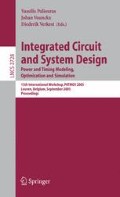Abstract
The normal-hearing system extracts monaural and binaural features from the signals at the left and right ears in order to separate and classify sound sources. Robustness of source extraction is achieved by exploiting redundancies in the source signals (auditory scene analysis, ASA). ASA is closely related to the “Cocktail Party Effect”, i.e., the ability of normal-hearing listeners to perceive speech in adverse conditions at low signal-to-noise ratios. Hearing-impaired people show a reduced ability to understand speech in noisy environments, stressing the necessity to incorporate noise reduction schemes into hearing aids. Several algorithms for monaural, binaural and multichannel noise reduction have been proposed, which aim at increasing speech intelligibility in adverse conditions. A summary of recent algorithms including directional microphones, beamformers, monaural noise reduction and perceptual model-based binaural schemes will be given. In practice, these schemes were shown to be much less efficient than the normal-hearing system in acoustically complex environments characterized by diffuse noise and reverberation. One reason might be that redundancies in the source signals exploited by the hearing system are not used so far by noise reduction algorithms. Novel multidimensional statistical filtering algorithms are introduced that might fill this gap in the future.
Noise reduction schemes often require high computational load which results in a high power consumption. To reduce the computational expense one promising approach could be to reduce the numerical precision in specific parts of the algorithm or to replace costly parts by computationally simpler functions. This might lead to additional distortion in the signal that reduces the perceived audio signal quality. Quality Assessment is needed to control the negative effects of power optimization in the algorithms. However, subjective listening tests are time-consuming and cost-intensive and therefore inappropriate for tracking small changes in the algorithm. Objective quality measures based on auditory models that can predict subjective ratings are needed. We introduce a quality test-bench for noise reduction schemes that helps the developer to objectively assess the effects of power optimization on audio quality. Hence, a compromise between audio quality degradation and power consumption can be obtained in a fast and cost-efficient procedure that is based on auditory models.
For more information and related literature please refer to:
“http://www.physik.uni-oldenburg.de/Docs/medi/publhtml/publdb.byyeardoctype.html”
Access this chapter
Tax calculation will be finalised at checkout
Purchases are for personal use only
Author information
Authors and Affiliations
Editor information
Editors and Affiliations
Rights and permissions
Copyright information
© 2005 Springer-Verlag Berlin Heidelberg
About this paper
Cite this paper
Rohdenburg, T., Hohmann, V., Kollmeier, B. (2005). Tutorial Hearing Aid Algorithms. In: Paliouras, V., Vounckx, J., Verkest, D. (eds) Integrated Circuit and System Design. Power and Timing Modeling, Optimization and Simulation. PATMOS 2005. Lecture Notes in Computer Science, vol 3728. Springer, Berlin, Heidelberg. https://doi.org/10.1007/11556930_76
Download citation
DOI: https://doi.org/10.1007/11556930_76
Publisher Name: Springer, Berlin, Heidelberg
Print ISBN: 978-3-540-29013-1
Online ISBN: 978-3-540-32080-7
eBook Packages: Computer ScienceComputer Science (R0)

